After a last-day disaster led to relegation from the Premier League experts say the catalyst for future success at Birmingham City has switched from the pitch to the boardroom.
The board is facing a £30 million shortfall in revenue after dropping out of the top flight – a drop which led to the likes of Leeds United and Portsmouth collapsing into administration.
Although the club’s holding company had a less than successful share issue last October there have been few clues about its financial state, but football finance experts believe chairman Carson Yeung is now the central figure in its future.
Blues enjoyed total broadcast payments of £39.8 million from the Premier League last season, but can expect less than £16 million for the next two season in “parachute payments” if the club is unable to return to the top flight.
Dr John Beech, head of sport and tourism at Coventry University, said the overall shortfall for next season will be about £30 million – and believes the club is set to lose ground in the fight for revenue from the lucrative Far East market.
He said: “You are looking at £30 million as a basic figure, if you take off the inevitable drop in broadcast rights.
“The only slightly encouraging sign is Birmingham will have some additional broadcasting rights for playing in Europe.
"But there will also be a drop in sponsorship income, I would imagine. There will also likely be an impact on merchandising. The club has been aiming at the Far East and their fan support is likely to be significantly weakened there as a result of relegation. And there will also be a drop in attendances.”
Blues fans are eagerly awaiting news from the boardroom at St Andrew’s after accountants who audited the books of Birmingham International Holdings stated in October that the club needed to raise £10.5 million to “continue to operate within its agreed bank facilities”.
The auditors went on to say: “These conditions indicate the existence of a material uncertainty which may cast significant doubt about the ability to continue as a going concern.”
Dr Beech said the club’s debts – which stand at more than £29 million – are a significant concern, but by no means the worst in the country.
He added: “The biggest problem at Birmingham City is they have got serious debt. It is not one of the worst – and is not as bad as West Ham – but it has to be serviced.
"There was this qualification that they needed to reduce their overdraft and there was this share issue which didn’t go terribly well, so there is already a question mark there.”
A key element of future budgetary plans at the club will be parachute payments – funding given to relegated clubs by the Premier League to soften the financial blow – of £16 million for two years followed by two years of £8 million payments.
However, it is likely player sales will have to be made, as well as cuts to the wage bill which accounted for more than two-thirds of turnover in the 2009/10 season, and 75 per cent of sales came from broadcast payments.
Former West Bromwich Albion star Brendon Batson, who years after playing for the club became its managing director, said it was crucial that clubs are prepared to finance a relegation.
“Who would have thought Birmingham City were going to get relegated after the Carling Cup win? Suddenly from being comfortable in the top flight they have to start again,” he said.
“Normally you would have a model A and model B – model A is where you stay up and you can freshen up and sign better players and model B is where you get relegated and have to look at your costs.
"Things are a bit different now because parachute payments go across four years instead of two.
“But it is important to be able to bounce back in your first year – after then the pressure is really on. It is also important how you set up players contracts so there is a reduction in your costs if you are relegated.”
Investment expert Hannah Edwards, director of BRI Asset Management, said it was difficult to understand Blues’ finances thoroughly because of the rules of the Hang Seng index in Hong Kong.
He said: “On the Hang Seng the requirement of disclosure and the type of information that they need to list is less onerous.”
























